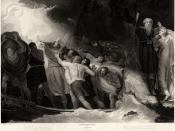ProsperoÃÂs complexity as a character seems to stem from his almost dual nature evident even from the first act of the play. His love for and extreme kindness towards Miranda are contrasted very strongly against his hatred of Antonio and his maltreatment of Ariel and subsequently Caliban.
Prospero undoubtedly controls the dramatic action of the play but his motives are oftentimes unclear. Shakespeare immediately establishes a plausible, justifiable reason for ProsperoÃÂs retribution: to promote his daughter to her rightful position in society and to ensure her future by binding her to Ferdinand in marriage.
However readers spend the rest of the play trying to decipher whether or not Prospero truly acts in favour of his daughterÃÂs interests or his own. Indeed it is indisputable that Prospero does not indulge his own natural inclination for revenge. However Shakespeare tempers ProsperoÃÂs vengeful acts against those of well being.
Shakespeare uses Prospero to develop the theme of power and betrayal-good men can be influenced by the machinations of other men. The betrayal of Antonio has caused Prospero to become bitter and hard. As a result Prospero comes across as cold and cruel toward Ariel and Caliban-his two servants on the island- bit it can be argued that he is only solidifying his position as ruler of the island. A position that has been unlawfully taken from him once before, a situation that he has taken extreme caution to prevent ever occurring in the future; hence why the Caliban, Trinculo and Stephano plot is never expected to succeed, as Shakespeare makes the audience fully aware in one of the most effective uses of dramatic irony in the play. Indeed the comedic effect is priceless as the innocent, uneducated Caliban is confident of his freedom and of the success of the murder plot.
Yet even while ProsperoÃÂs self-serving impulses can be justified, one still wonders to what extent are these justifications truly applicable as while the play is about betrayal it is also about justice and the responsibility an individual must assume to admit his wrongdoings and ask for pardon.
BIBLIOGRAPHYThe Tempest- William Shakespearehttp://www.sparknotes.com/shakespeare/tempest/http://www.cummingsstudyguides.net/xTempest.html#Tempest





